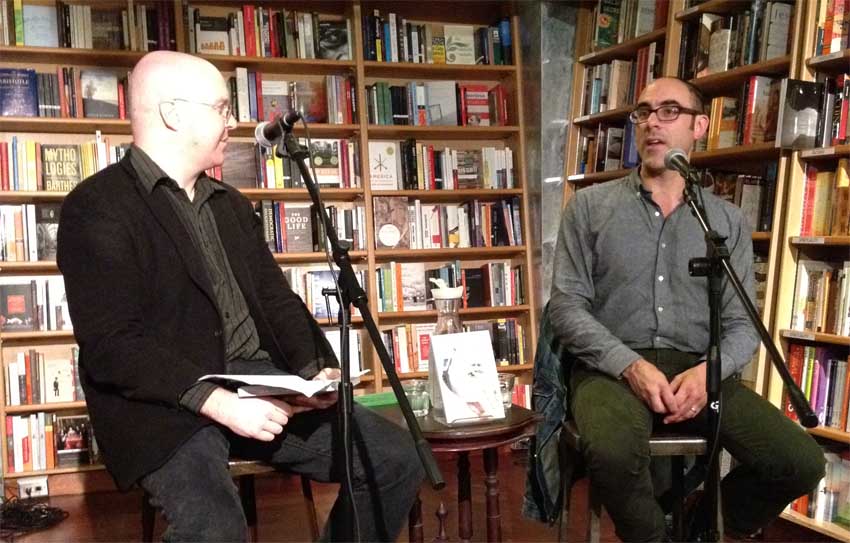J. Robert Lennon is most recently the author of Familiar. He previously appeared on The Bat Segundo Show #300. This conversation was recorded live at McNally Jackson on October 3, 2012. This is also the final episode of The Bat Segundo Show. Thank you for listening.
Listen: Play in new window | Download
Condition of Mr. Segundo: Contending with five possible endings to his existence.
Author: J. Robert Lennon.
Subjects Discussed: Attempts to disseminate chocolate chip cookies in a bookstore, parallel universes, being confident in the rightness of not knowing, getting inside other people’s heads, how Elisa’s conditional ambiguity created a deeper connection with the reader, whether framing shops can exist after the Great Recession, why guys named Larry tend to sound sexy, Stephen Dixon’s “The Frame,” art and self-therapy, Wilhelm Reich as influence and huckster, technological reliance and memory, a digital camera in which nobody bothers to offload the photos, being a photography nerd, the multiverse per Brian Greene and William James, Lennon’s affinity for characters with bare feet, subconscious calls for New Age aesthetic, the Stephen King aesthetic of everyone wearing blue jeans, casual Fridays applied to novels, when a character can be associated with both Hugh Hefner and Hephaestus, spending far more time revising than writing, a definition of insanity of finding meaning when there is no meaning, needlessly close reading, Reevesport, Lennon’s secret shadow map of central New York, Kubrick’s adaptation of The Shining, physically impossible floor plans in fiction and films, labyrinths and labyrinthine structures, how the question of identity is a trap, Heisenberg’s Uncertainty Principle, The Funnies, comparisons between Silas and David Foster Wallace, Jonathan Blow, revision revelations, Braid, advice Lennon received from Tom Bissell, video game titles that aren’t dumb enough, Lennon’s efforts to write a draft without internal monologues, Richard Matheson, The Twilight Zone, the thin line between insanity and genius, the stigma against unusual perspectives, broken and corrupt institutions, crackpots, impostor syndrome, Capgras delusion, Roger Zelazny’s Amber books, similarities between Familiar and Nine Princes in Amber, the Nine Princes in Amber Commodore 64 ROM, cell phone addiction, how smartphones reveal mundane lives, Infocom text adventure games, and fictional vs. video game description.
EXCERPT FROM SHOW:
Correspondent: We have a lot of cookies and they have to be eaten. So please pass these along.
Lennon: These are the very same cookies you saw today on Twitter in the form of uncooked dough.
Correspondent: In the form of uncooked. And then there was a picture of them being cooked. So now we see the transmission from digital to reality. Sort of like your book.
Lennon: You see the baby pictures. And now they’re graduating from college. And now they’re all going to die.
Correspondent: Yes. And they need to be sent away to your stomachs. So please. Anyway, John, how are you doing?
Lennon: Hey, Ed, I’m doing very well. Thank you for having me on the show again. And thanks for sharing your swan song with me.
Correspondent: No worries. So in this book, you have this 46-year-old woman and she’s named Elisa Brown. She enters another life very early on in the book. She’s put on some weight. She trades in this cracked Volvo — or cracked Honda; there’s a Volvo that comes later — with a Dodge Intrepid. She sees her son Silas, who has died in her previous life, suddenly alive in this new one.
Lennon: I think what you’re not explaining is that it seems to be a parallel universe.
Correspondent: It seems.
Lennon: All this happens instantaneously. And she’s transferred into this apparent other world.
Correspondent: Yes. Apparent. Which leads me to my initial question. I mean, she could be inhabiting a parallel universe. This could be a psychological projection. This could be a maternal fantasy. It could be any number of things. You leave this up to the reader. I’m wondering, as author, if you knew with any certainty what this was all about.
Lennon: I aggressively and definitively refuse to know.
Correspondent: You refuse to know. It’s a hell of a way to write a book.
Lennon: Like I’m very confident in the rightness of not knowing. I’ll put it that way.
Correspondent: Okay. But how do you get inside the head of a character when you don’t exactly know what the condition of that head is? Or do you?
Lennon: Does anyone know the condition of their own head? Or the meaning or the circumstances?
Correspondent: Do you know the condition of your own head?
Lennon: Of course not! No! I think it’s an arch sci-fi metaphor for the feelings of dislocation that all of us have in the less obviously nerdy way.
Correspondent: Well, it seems that the very ambiguity of Elisa would allow, as I suggested, the reader to find her own way into what this is all about. And I’m curious. Were you thinking more about the reader in mind with this book? Some of your other books have dealt with minutiae or quotidian life — such as Mailman, to very alarming degrees in that wonderful book.
Lennon: Alarming quotidianness.
Correspondent: Yes, exactly. In the case of Elisa, I’m wondering. Did that uncertainty allow you to connect with the reader perhaps more than your other characters?
Lennon: That was my hope. I mean, my goal in presenting this conceit or this unsolvable dilemma to the character — she ends up quite logically, because she’s a scientist, searching for both the meaning and the cause of what has apparently happened to her. But in the process, it forces her to do other types of searching of the self that she was previously unwilling to undertake.
Correspondent: Got it. So there’s this framing shop in the book run by a guy named Larry. And this intrigued me quite a bit. Because I said to myself, “Well, how can a framing shop exist in a small town after the 2008 recession?” It leads me to wonder, hmmm, I wonder if this is possibly a fantasy.
Lennon: (laughs) You’re onto me.
Correspondent: I think there’s something romantic about a guy named Larry. I think you and I can both agree about that.
Lennon: Sure. Sure.
Correspondent: But I wanted to ask you where this came from. Do you know of a framing shop in a small town that is financially successful? Or does Larry have another business of some sort? And, of course, Elisa as well does all sorts of naughty things with him and we only really see him through how Elisa observes him in that Korean cafe and so forth. So I’m curious about the origins of Larry and how you stuck your thumb in the nose of present economic realities.
Lennon: This is a curious thing to fixate on, I must say.
Correspondent: Well, I’m a curious person. And you’ve written a curious book!
Lennon: Thank you. There are several functioning frame shops in my town. It didn’t seem terribly unusual. But the framing bit is — I don’t know why he’s in a frame shop. Maybe…has anyone read the Stephen Dixon story “The Frame”? It’s essentially a joke about a framed story. And a guy goes into a frame shop. And this reminds him of something that happened with his sister in the past. And the frame of the story is a frame. Maybe I had that in mind as a goofy meta device. But in any event, the plot device that you’re talking about is that, in her old life, what she considers to be her real life, she is having an affair with this guy Larry from the frame shop. Whom she met because she brought some art that she was trying to make to be framed. And the art was therapeutic art to deal with the death of her son. And in this new world, where her son never died, this guy doesn’t know her. And so she tries to get it on with him. It doesn’t go as planned. But I like the idea of a quiet business. That the whole point of it is not about the content. It’s about the context.
Correspondent: Yes, it’s about the framing.
Lennon: Exactly.
Correspondent: I see. So the artistic aspirations that Elisa has in this book, which aren’t necessarily totally fulfilled. We sort of see a little bit toward the end. But basically she has this studio. She’s not really doing much about it. Why is it that art — represented of course through Elisa’s painting and then transferred later onto Silas and his video game company — why is this the benchmark for these characters who are in such disarray to try to find themselves? I was curious why this seemed to be the motive for these characters.
Lennon: Well, I’m always kind of interested in this idea that creative effort is a form of therapy for people. And that usually doesn’t create good art necessarily. That the kind of self-criticism required for making…
Correspondent: True art.
Lennon: Yeah. It’s maybe not compatible with the needs of a self-therapeutic process. So in each of these worlds, I gave the creative output to one or the other character as one of them is dealing with the death and her possible culpability in it. And the other is dealing with his horrible childhood, for which he blames her. And she doesn’t get to do art in the world where he’s alive.
Correspondent: Yes. But it’s interesting that you call it therapy in light of all of the Wilhelm Reich references throughout the book. There’s some sly quotes. There’s this crazy family therapist named Amos, who is using very Reichian-like techniques. The whole idea of “blame yourself first,” which comes from Reich. And it’s interesting that that exists side by side with art. And it makes me wonder, well, is Larry, who we were talking about earlier, is he offering a form of therapy in terms of his sexual escapades? But I’m curious about where the Reich interest came from. I mean, he’s known as both one of the most important therapeutic forces of the early 20th century. But simultaneously, he’s also something of a huckster.
Lennon: Yeah. And I haven’t read him extensively. I’ve read some of the book that that quote comes from. But I read enough to use him as a motif. But not enough to know what the hell I’m talking about. But the entire book is about ways of perceiving experience and the extent to which people choose, no matter how hard we think we’re working, to understand the truth about our lives. We’re engaged in a form of self-serving narrative making. And so this whole process, which I think is hidden from us a lot of the time in real life — I’m sort of foregrounding this book by giving her an extra life and an extra version of her life to compose. And she seems to be screwing it up just the same way she screwed up the other life, which I think is what we would all do if we were given a second chance.
Correspondent: But is she entirely screwing it up? I mean, this book has some fairly damning things to say about technology, starting from the first technological implement we see. This camera, that has about a year worth of photos on it. And there is an interesting domestic dispute when all of the photos disappear. And the fact that these photos have not been transferred over says something about what our relationship is to memory through technology. And we see later on, of course, she sees a guy whose looking down at his phone over the last dregs of his meal. And of course there’s the video game motif as well. So I’m wondering why this notion of technology is almost defining many of these characters. Do you think we’re just now in this realm and fiction has to wrestle with this vital point of living?
Lennon: Yeah. I mean, I don’t think of technology as a motif that’s sort of extrinsic from psychology and emotion and that which has to be addressed. Rather, I wanted to bring it into the fabric of the book in a way that it might not naturally do so for nerdy people like this family. My wife said she was very proud of me with the camera thing. The deal with the camera is that they just never print the photos or put them on the computer or anything. They’re just all on the camera. And so everyone, they want to look at pictures, they just look for the camera and they pick it up and they just go like this for a while. And then Elisa’s mother-in-law appears to have deleted the photos of the child who has died. And for whatever reasons we don’t really understand.
Correspondent: Or did she? She just could have been messing with it. We don’t know.
Lennon: Maybe not. And Elisa ends up — she realizes that if she really wanted, that the files are still on there. That all, when you delete a file from, say, a hard disk or a memory card or something, all that changes is the bit of information that tells the computer or the camera that the photo is there. It’s still there. It just can’t be seen anymore. So this for me was kind of the metaphor for things that we try and put out of our heads that are still there. And the reason my wife is proud of me is because I’m a photography nerd. And I would never in a million years treat photographs like this. I’d have to download them to my computer and then edit them and disseminate them into a million different places and print them out and flog them in front of people. And I think it was really a stretch for me to realize that not everyone is like this.
(Photo: Sarah Weinman)
The Bat Segundo Show #497: J. Robert Lennon II (Download MP3)
This text will be replaced




